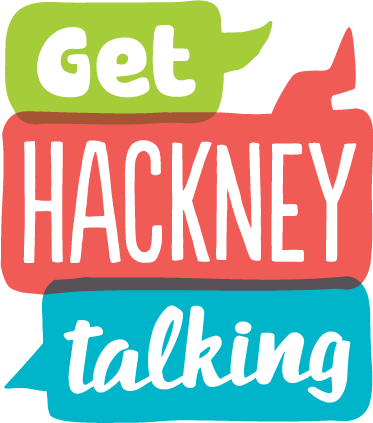There is a huge variation in children’s rate of learning to talk and communicate. This can be for many different reasons. The chart below will provide you with some information. If you have concerns, in the first instance talk about your child’s development with your child’s nursery key worker, class teacher or health visitor, or other professionals who have an understanding of child development and who also know your child. When talking to the professional make sure you discuss:
- General development, such as walking and self help skills (such as independent eating and getting dressed)
- How your child gets along with other children and adults
- Hearing and ability to concentrate
- Following instructions
- Expressing him or herself
- Speech clarity and fluency
- Play skills
If you are still concerned and your child lives or goes to school in Hackney or The City please get in contact. Contact details are via the Get Help page.
You can also check how your child is getting on with their speech and language skills using this Progress Checker.
This poster has information about what is ‘typical talk’ for children and young people in secondary school.
0-6 months
|
Milestones
|
Advice
|
By 6 months of age, most babies should be able to:
Look around when they hear a sound near them.
Look at your face when you are talking to them.
Join in when they see others smiling and laughing around them.
Make a range of cooing, gurgling and babbling sounds.
Use their sounds to try and get your attention.
|
Consult a professional if your child is NOT:
Reacting to sounds in their environment.
Making any cooing, gurgling or babbling sounds.
Smiling when someone smiles at them |
12-18 months
|
Milestones
|
Advice
|
By 18 months of age, most toddlers should be able to:
Engage in simple pretend play, such as talking on a telephone
Play alongside other children and adults and likes a familiar adult to be nearby.
Say their first word at around 12 months. By 18 months uses up to 50 words.
Follow simple instructions, e.g. ‘get your shoes’ and understands simple questions, e.g. ‘Where’s mummy?’ |
Consult a professional if your child is NOT:
Playing with an activity that they have chosen for at least 30 seconds
Showing any awareness or interest in others
Using variety in play e.g. your child’s play is limited to banging toys, bringing them to their mouth, lining toys up, being fixated with spinning toys
Saying their first word by 18 months |
18-24 months
|
Milestones
|
Advice
|
By 24 months of age, most children should be able to:
Say 50 or more words and understand many more
Put words together in 2 word phrases such as ‘teddy gone’ or ‘baby sleeping.’
Understand simple instructions in context (e.g. ‘give me the cup’ or ‘where’s pussy cat?’).
Point to some body parts, familiar people, animals, toys, pictures in books, etc.
Concentrate on activities of own choice but still has difficulty moving on to something else.
Act out own or other’s actions, e.g. puts doll in bed, gives teddy cup of tea.
Relate wider range objects appropriately e.g. puts spoon in a cup, brushes own hair.
|
Consult a professional if your child is NOT:
Following simple instructions, e.g. ‘come here’ without gesture.
Copying actions or words of others
Recognising words or saying over 20 recognisable words as they approach 2 years
Pointing or using other gesture to get what they want
Pointing out things of interest, e.g. a plane flying overhead |
2-3 years
|
Milestones
|
Advice
|
By 2 ½ years of age, most children should be able to:
Say at least 200 recognisable words
Have an increasing range of short phrases with 2-3 words, such as ‘more juice’ or ‘where cat gone?’.
Use longer sequences of role play, e.g. making dinner, putting sick toys to bed
Join in play with other children for short time but needs adult’s help to share toys / attention
By 3 years of age, most children should be able to:
Understand longer instructions with up to 3 key words, e.g. ‘put daddy’s cup on the table’.
Make short sentences of 3 or more words and learning new words every day.
Ask many questions including ‘Where?’, ‘What?’ and ‘Who?’
Have a simple conversation about what they are doing or something that has happened.
May still show some grammatical mistakes, e.g. ‘I runned’.
Join in make-believe play involving other children and understands sharing.
Be understandable to adults for the majority of the time.
|
Consult a professional if your child is NOT:
Following two key words in instructions such as ‘where’s mummy’s phone?’
Joining words into short sentences
Trying to play with others
Is not using a variety of pretend or imaginative play – may be repetitive e.g. opening and closing doors or lining up toys
Concentrating on anything for more than a few seconds |
3-4 years
|
Milestones
|
Advice
|
By 4 years of age, most children should be able to:
Listen to longer stories and answer simple questions about the story afterwards
Answer simple "who?", "what?", "where?" questions about real events
Use a lot of sentences of 4 or more words, and combine ideas in sentences
Talk about activities at school, including talking about things that have happened in the past
Use and understand a range of language concepts such as colour, number, and time concepts (e.g.: yesterday, tomorrow)
Be understood by people outside of the family most of the time |
Consult a professional if your child is NOT:
Able to express themselves and talk about activities they have done using sentences of 4 or more words
Able to follow instructions, or answer simple ‘who’, ‘what’ ‘where’ questions
Responsive or is very slow to follow instructions.
Able to be understood by most people
Able to talk easily without repeating or getting stuck on words or parts of words |
4-5 years
|
Milestones
|
Advice
|
By 5 years of age, most children should be able to:
Join in with co-operative play with peers and choose their own friends
Understand an increasing amount of complex language such as ‘next’, ‘before’ and ‘in between.’
Also understand simple language without stopping activity to look at speaker
Answer simple “wh” questions about a short story, such as “Who watched the film?” and “Where did the dog live?”
Learn lots of new words and often surprise parents with the words they are learning.
Use complete sentences, such as “Teddy’s eating chocolate ice-cream”. Although these may still make grammatical errors with plurals and tenses, for example: 'feets' for feet and 'goed' for went.
Describe the meaning/function of simple words
Use most speech sounds accurately; may still have difficulties pronouncing l, s, r, ch, th.
|
Consult a professional if your child is NOT:
Mixing or playing with their peers
Understanding simple concepts related to size, time or shape
Able to answer simple ‘wh’ questions appropriately (‘what’, ‘who’, and ‘where’ )
Learning lots of new words
Producing full sentences about past and future events
Able to organise their ideas in order and tell a simple story that sticks to the topic
Able to tell a simple story and talk
Fluent with their talking – i.e. they are stammering |
6-7 years
|
Milestones
|
Advice
|
By 7 years of age, most children should be able to:
Answer more abstract questions such as ‘how’ and ‘why’
Remember information from a story and respond to questions about it
Respond to spoken instructions whilst engaged in another activity
Learn the vocabulary on a wide range of new topics
Follow instructions that have a number of different steps (e.g.: do this and then this)
Be able to retell a short story or give an account of a recent event
Be understood by an unfamiliar adult
Have developed friendships and will be able to initiate and engage in play |
Consult a professional if your child is NOT:
Answering “wh” questions (e.g. what? Who? Where? When?)
Focusing on an adult-led activity
Following instructions
Learning new words easily
Constructing sentences or is missing out words / using words in the wrong order.
Telling stories meaningfully
Producing sounds / speech can be unclear
Making and keeping friends |
8-11 years
|
Milestones
|
Advice
|
During this age period, children should be developing skills in these areas:
Listening:
By this age, children are typically able to pay attention to someone speaking near them whilst they are doing a task
Understanding:
able to follow a complex series of instructions
Retain extended amounts of information, such as a story that has been read to them
Parents will be able to reason with their children
Expressive:
Able to use language to discuss issues and express their feelings
Become great story tellers! Their stories consist of the main events of the plot, the perspectives of different characters in the story and their own views and opinions.
Ask questions if they haven't understood something
Can re-word what they have said if someone doesn't understand them
Able to change their tone of voice to suit the situation |
Consult a professional if your child is NOT:
Joining in group conversations where topics and pace may change quickly
Able to make tell stories that make sense
Able to learn new words easily.
Able to say what might happen next or explain ‘why’ or ‘how’ to do something.
Able to find the “hidden” meanings in language if they are not clearly stated |
12-17
|
Milestones
|
Advice
|
During this age period, young people should be developing skills in these areas:
Following complex instructions e.g. ‘before you write your ideas, read the summary on Page 53 of Living History.’
Understanding that some words have more than one meaning e.g. bark, match.
Understanding non literal language e.g. ‘caught you red handed’
Understanding sarcasm
Monitoring their understanding, and seek clarifications
Understand and use a wide range of abstract words relevant to what they are learning
Providing dictionary type definitions of words
Use long complex sentences joined by words such as ‘even though’, ‘unless’.
Telling long and more involved stories without losing listener interest
Awareness that they talk differently to friends than teachers
Switching topic appropriately in conversation, and taking the listener with them |
Consult a professional if your child is NOT:
Understanding the meaning of instructions and needs them broken down
Understanding and using a range of abstract words
Understanding sarcasm
Changing their communication style according to who they are relating to
Unable to explain in detail ‘how’ to do a task or explain complex reasons |


